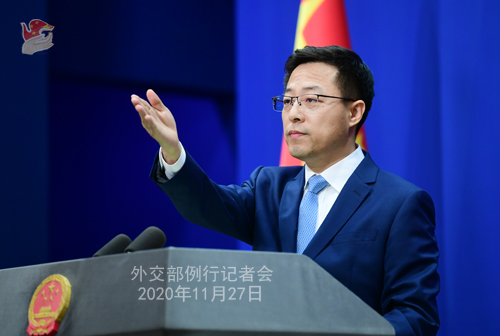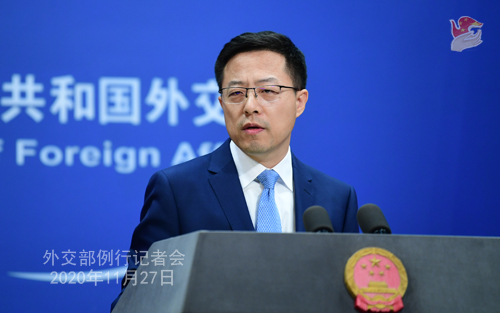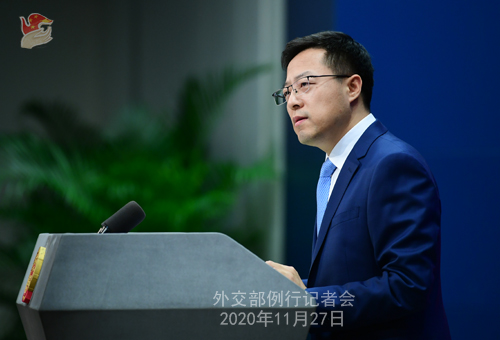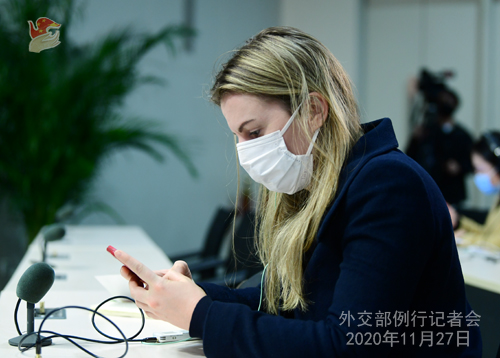| Foreign Ministry Spokesperson Zhao Lijian's Regular Press Conference on November 27, 2020 |
| 2020-11-27 20:30 |
|
CCTV: This morning, the 17th China-ASEAN Expo and the China-ASEAN Business and Investment Summit kicked off in Nanning, Guangxi. How does China evaluate the outcomes of China-ASEAN cooperation? What are your expectations for the future development of China-ASEAN relations? Zhao Lijian: Recently, "China-ASEAN" topics have captured a lot of headlines. This morning, the opening ceremony of the 17th China-ASEAN Expo and the China-ASEAN Business and Investment Summit was held in Nanning, Guangxi. President Xi Jinping delivered a video speech and Director Yang Jiechi attended the opening ceremony. Other events like the China-ASEAN Cooperation Conference on Technology Transfer and Innovation, the China-ASEAN Information Port Forum, and the China-ASEAN Beidou Application and Industrial Development Cooperation Forum were also held as scheduled yesterday. China always regards ASEAN as a priority in its neighborhood diplomacy and a key region for the Belt and Road Initiative cooperation. As I said yesterday, the past ten years have been a "golden decade" for the economic and trade relations between China and ASEAN, which witnessed deepening political mutual trust, connectivity, economic integration, trade cooperation, and people-to-people exchanges. China-ASEAN ties, the most successful and dynamic in Asia-Pacific regional cooperation, stand as a vivid example of BRI cooperation and the building of a community with a shared future for mankind. Mutual respect and mutual benefit are the distinctive hallmarks of China-ASEAN relations. The future will certainly open up more space for cooperation between China and ASEAN. We hope that this grand gathering will help participants create more business opportunities, reap more results, and work together to create a better future. Reuters: Venezuela has reportedly resumed direct shipments of oil to China despite US sanctions on the Venezuelan oil sector. A US Treasury Department spokesperson said on Wednesday that those engaging in activities in Venezuelan oil sector risk exposure to sanctions. What's the ministry's comment on this? Zhao Lijian: Venezuela is China's important cooperative partner in Latin America. China-Venezuela cooperation adheres to the principle of equality, mutual benefit and market principles. Such cooperation complies with laws and regulations and benefits the two countries and peoples. We are convinced that no matter how the situation evolves, China-Venezuela cooperation will proceed as usual to the benefit of both peoples. China News Service: According to preliminary results announced by Burkina Faso's National Independent Electoral Commission on November 26 local time, Roch Marc Christian Kabore, incumbent president and candidate of the People's Movement for Progress, has won the presidential election with 57.87 percent of the total votes. Do you have any comment? Zhao Lijian: We note the preliminary results of the presidential election announced by the National Independent Electoral Commission of Burkina Faso as well as African observer mission's positive observation of the election process. We extend congratulations to President Roch Kabore on his re-election. Recent years have seen China-Burkina Faso relations growing with a strong momentum, delivering tangible benefits to the two peoples with fruitful cooperation. China attaches high importance to developing relations with Burkina Faso and stands ready to join hands with the new government to strengthen exchange and cooperation across the board and achieve new progress in bilateral relations.
FSN: The anti-dumping measures that have been imposed on Australian wine effectively make the Chinese market no longer commercially viable for Australian wine export even before the conclusion of the anti-dumping probe. What's the reason for such punitive measures? Zhao Lijian: China's Commerce Ministry has issued a notice on the provisional anti-dumping measures you mentioned. I'll refer you to the competent authority for more information. China's position on developing relations with Australia is consistent and clear. We believe that a sound and stable China-Australia relationship is in the interests of both countries and peoples. It is hoped that the Australian side will do more things conducive to mutual trust and cooperation as is in line with the two sides' comprehensive strategic partnership, so as to provide conditions to bring bilateral relations back onto the right track. Beijing Youth Daily: You said the other day that China and Arab states will hold a video conference for experts to discuss reform and development. Any news about that? Zhao Lijian: Thank you for your interest in this conference. On November 26, supported by the China-Arab States Cooperation Forum (CASCF), a video conference on reform and development between Chinese and Arab experts was successfully held by the China-Arab Research Center on Reform and Development. Scholars who attended the conference were from research institutes in China, Saudi Arabia, the UAE, Egypt, Iraq, Jordan, Tunisia and other countries. They had in-depth discussions and made valuable proposals under the topics of "jointly building a community with a shared future for China and Arab States" and "developing a multilateral dialogue platform for the Gulf region". Faced with major world changes unseen in a century, both Chinese and Arab experts believe the two sides share common tasks and challenges, and the will to deepen cooperation is even greater in light of the spreading COVID-19 pandemic this year. At the ninth ministerial meeting of the CASCF in July, both sides agreed to include the proposal of "jointly building a China-Arab community with a shared future for a new era", which was put forward by President Xi Jinping, in the outcome document of the ministerial meeting and present it to the China-Arab summit for discussion. It is just the right time for us to forge a China-Arab community with a shared future. Both sides need to continue advancing BRI cooperation and people-to-people exchange and make arduous efforts for building a community with a shared future for mankind. The Arab experts highly commended State Councilor and Foreign Minister Wang Yi's proposition to develop a multilateral dialogue platform for the Gulf region. They believe this Chinese proposal to resolve regional hotspot issues demonstrates China's consistent position of easing regional tensions and promoting regional stability and development, which is conducive to the settlement of relevant issues. Experts on both sides stressed that unilateralism and maximum pressure won't work, and countries need to uphold multilateralism and realize the common goal of regional peace and stability through collective consultation. AFP: A question on China's anti-dumping measures on Australian wine. Is this decision 100 percent motivated by trade or is it linked to the diplomatic tensions between the two countries? Zhao Lijian: My colleagues and I have taken many questions on China-Australia trade. Chinese competent authorities' measures on imported products are in line with Chinese laws and regulations and international customary practices. They are being responsible for Chinese consumers and domestic industries. At the same time, mutual respect is the basis and precondition for practical cooperation between countries. The Australian side should handle bilateral relations following the principle of mutual respect and equality, do more things conducive to mutual trust and cooperation as is in line with the two sides' comprehensive strategic partnership, and create enabling conditions for the practical cooperation. Reuters: We've noticed that some state media outlets have published articles suggesting that the coronavirus did not originate in China. Some of these articles cite the presence of coronavirus traces on imported food packaging to warrant the point that the virus may have originated elsewhere. Is it China's official position at this point that the coronavirus originated outside of China? Zhao Lijian: For many times we've read and heard news worldwide on the dates and locations of the outbreak of the COVID-19 pandemic, which proves once again that origin-tracing of the virus is a complex matter of science requiring international research and cooperation by scientists across the globe, so as to get a better understanding of its animal hosts and route of transmission. By doing so, we will do a better job in preventing future risks and protecting safety and health of people all over the world. Origin tracing is an ongoing process that may involve multiple countries and areas. We hope all countries will adopt a positive attitude, strengthen cooperation with the WHO and advance the tracing process worldwide. China will continue actively participating in the global research on the virus' origin tracing and route of transmission, and work with the international community to contribute to global cooperation on fighting the virus.
Shenzhen TV: We noticed that an article published recently by Australian media exposed the exchange of interests and collusion between the Australian Strategic Policy Institute and its foreign sponsors. According to this article, funding from the U.S. Department of State, ASPI's biggest sponsor, skyrocketed to almost AU$1.4 million over the previous fiscal year, representing a 367 percent increase, and all the funds were in some way directed to research projects attacking China. I wonder if you have any comment on this? Zhao Lijian: I also read this article titled "Agency of Foreign Influence". In fact, my colleagues and I responded to ASPI-related matters many times, and this is not even the first time that the true color of ASPI is revealed by Chinese and foreign media. Truth is sharpened by debate and facts emerge clearer from discussions. The world already knows clearly whether this so-called "institute" conducts independent research or speaks lies and disinformation to serve the interests of its sponsors. I'd like to add that ASPI will only inflict humiliation on itself and become a laughing stock no matter how hard it tries to put on a show. China Daily: According to media reports, the Australian military recently released a report detailing war crimes allegedly committed by Australian forces serving in Afghanistan, including many incidents involving the killing of prisoners and innocent civilians. Australian political leaders and media have criticized and condemned this. Does China have any comment? Zhao Lijian: We are shocked by the details revealed by relevant reports and strongly condemn such behaviors that go against international conventions and human conscience. We call for a thorough investigation into the matter to bring the culprits to justice. Australia and some other western countries always portray themselves as human rights defenders and wantonly criticize other countries' human rights conditions. The facts revealed by this report fully exposed the hypocrisy of the "human rights" and "freedom" these western countries are always chanting. We hope relevant countries will reflect upon their own behavior, think more about how to address serious human rights violations that trample upon conscience of humanity at home, and stop using human rights as a pretext to engage in political manipulation. Reuters: Thanks for your comprehensive answer just now. Does China subscribe to the position that seems to be emanating at the moment from some state media outlets suggesting that the coronavirus did originate perhaps from abroad? Zhao Lijian: What I just reiterated is China's consistent position on origin-tracing. As we've repeatedly stated, although China was the first to report cases, it doesn't necessarily mean that the virus originated in China. We believe that origin-tracing of the virus is a complex matter of science requiring international research and cooperation by scientists across the globe to get a better understanding of its animal hosts and route of transmission. By doing so, we will do a better job in preventing future risks and protecting safety and health of people all over the world. Origin tracing is an ongoing process that may involve multiple countries and regions. We hope all countries will adopt a positive attitude, strengthen cooperation with the WHO and advance the tracing process worldwide.
|
| |||||||||||||||
|
|||||||||||||||





